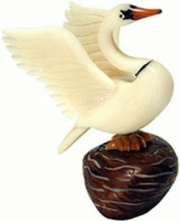Difference between revisions of "Tagua nut"
Jump to navigation
Jump to search
m (Text replace - "== Authority ==" to "== Sources Checked for Data in Record ==") |
m (Text replace - "\[http:\/\/cameo\.mfa\.org\/materials\/fullrecord\.asp\?name=([^\s]+)\s(.*)\]" to "$2") |
||
| Line 2: | Line 2: | ||
== Description == | == Description == | ||
| − | A natural replacement for [ | + | A natural replacement for [[ivory|ivory]] obtained from the tagua palm (''Phytelephas equatorialis'') that is native to South America. Tagua nuts are harvested, the dried to form a hard, white, carvable material. They have been used since the 1920s as an inexpensive substitute for ivory. Tagua nuts were historically used for buttons and inlays, but in recent years, tourists have created an extensive market for small carved figurines. |
== Synonyms and Related Terms == | == Synonyms and Related Terms == | ||
Revision as of 11:41, 10 May 2016
Description
A natural replacement for Ivory obtained from the tagua palm (Phytelephas equatorialis) that is native to South America. Tagua nuts are harvested, the dried to form a hard, white, carvable material. They have been used since the 1920s as an inexpensive substitute for ivory. Tagua nuts were historically used for buttons and inlays, but in recent years, tourists have created an extensive market for small carved figurines.
Synonyms and Related Terms
tagua palm nut; vegetable ivory
Additional Images
Sources Checked for Data in Record
- G.S.Brady, Materials Handbook, McGraw-Hill Book Co., New York, 1971 Comment: p. 424
- Website address 1 Comment: http://www.oneworldprojects.com/products/tagua.shtml - contains images of many types of carved objects


